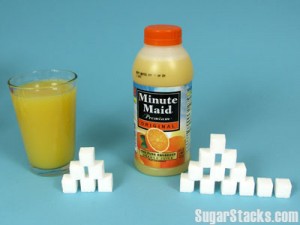I’m back from vacation and a busy week of catching up, and happy to share some health news again! This week, read about health messaging for nutrition, a brilliant way to prevent heart disease, Tim Noakes disregarding science, and more.
How Much Sugar?
 Are you confused when you hear gram amounts of nutrients in foods? For example, do you know what 70 grams of sugar represents? If you said no, you’re not alone. A recent study by researchers at the University of Alabama shows that most people need more concrete information to translate nutrition data into something meaningful. In the case of sugar, using sugar cubes to illustrate the amount of sugar in a beverage was much better understood than using the gram amount, and helped people decrease their sugar consumption. (If you’re wondering, 1 sugar cube contains 4 grams of sugar, about 1 teaspoon).
Are you confused when you hear gram amounts of nutrients in foods? For example, do you know what 70 grams of sugar represents? If you said no, you’re not alone. A recent study by researchers at the University of Alabama shows that most people need more concrete information to translate nutrition data into something meaningful. In the case of sugar, using sugar cubes to illustrate the amount of sugar in a beverage was much better understood than using the gram amount, and helped people decrease their sugar consumption. (If you’re wondering, 1 sugar cube contains 4 grams of sugar, about 1 teaspoon).
A great example of using such messaging is this website, which uses sugar cubes to illustrate the amount of sugar in various foods and beverages.
A Brilliant Way to Prevent Heart Disease
 I think it would be wonderful if physicians would prescribe lifestyle changes (healthy eating and exercise) more than they do medications for preventable diseases. But changing health behaviors is tough, and most physicians don’t have the time or expertise to counsel patients. But what about automatically referring at-risk patients for lifestyle change counseling?
I think it would be wonderful if physicians would prescribe lifestyle changes (healthy eating and exercise) more than they do medications for preventable diseases. But changing health behaviors is tough, and most physicians don’t have the time or expertise to counsel patients. But what about automatically referring at-risk patients for lifestyle change counseling?
A report released this week by the US Preventive Services Task Force recommends offering or referring adults who are overweight or obese and have other heart disease risk factors to intensive behavioral counseling interventions. The interventions would promote a healthful diet and physical activity.
The report backs up recommendations with a thorough review of studies showing that behavioral counseling for diet and exercise can reduce cholesterol levels, blood pressure, weight, glucose levels, and the incidence of diabetes.
Tim Noakes in the News
Many hold sports physiologist Tim Noakes in high esteem after reading his popular books (e.g. Lore of Running). But he is losing respect among scientists: recently he seems to be in the anti-establishment/conspiracy theorist camp, disregarding science (that doesn’t support his opinions), promoting his high-fat low-carb diet as evidence-based, and stating that a proven link between vaccines and autism have been covered up.
More links of interest this week:
- Sports Nutrition Resource for Swimmers and Other Aquatic Sports. The current issue of the International Journal of Sports Nutrition and Exercise Metabolism is dedicated to nutrition for aquatic sport (open access). It looks like a great resource, with many great articles from experts in the field. (IJSNEM Volume 24, Issue 4, August 2014)
- Can too many great players hurt a team’s success? Yes – in sports requiring teamwork & coordination. (Gretchen Reynolds, New York Times)
- Would mandatory food & nutrition classes help the health of Ontario students? Great idea – too bad more kids don’t learn to cook at home!(CBC)
- Educated consumers more likely to use potentially unreliable online healthcare information Look for trusted health sources – here are some excellent guidelines for evaluating health information. (Human Factors and Ergonomics Society)
- Eating Junk Food Changes Your Cravings->unhealthy foods might modify your palate (study published in Frontiers in Psychology)
- Limit the Licorice: 2 weeks of consuming licorice increases blood pressure in healthy subjects. (PlosOne, August 25, 2014).
- The Debate on Salty Foods, Continued. Here’s an excellent editorial, highlighting McMaster University research. (New York Times).
- The importance of science literacy & how science writers can help raise knowledge. (Globe and Mail).
- Lifestyle change program for diabetics shows many health & financial benefits. Adopting healthy habits benefits more than health.
You Can Learn Anything
A terrific video by Khan Academy.
______________
Photo Credits
- Sugar in Juice Photo by SugarStacks [CC BY 1.0]